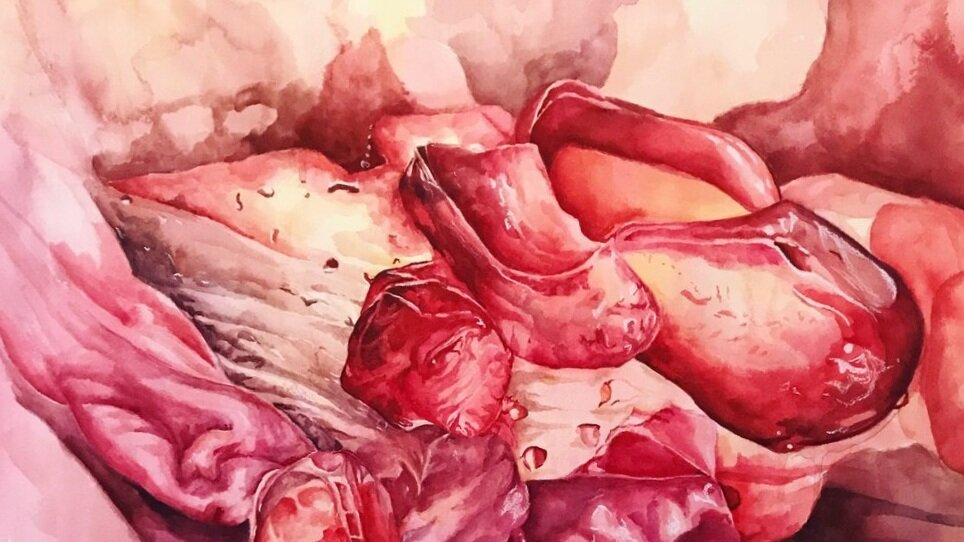
Two Grandmothers
Beth Rubinstein Bosworth
After Dana Martine Robbins
One grandmother fled Sokolov, not the Sokolov south of Lodz but Sokolov-Podlasky, which means “small town near or under woods” and was not far from Podi and the small village of Treblinka. That grandmother, Esther, had blue eyes, a fleshy nose, and false teeth that made her smile more embittered. The other grandmother, Ida, had grown up in this country. She was small-boned and dark-complected, and she had known hardship as a child because her father, a factory hand, spent his weekly pay on vodka. “Go bring him home,” her mother would tell Ida, who would stall—the spare tablecloth had to be wrung, the baby’s water boiled. Only then would she pull on the jacket she was already outgrowing. Esther arrived in New York one rainy Tuesday in 1922 and left on a sunny Monday some years later. For a while she traveled with a chess player named Gonzalez. She would call us from a nearby bus station—we could hear our father’s voice rising and not falling back down. “Just stay put, Esther,” he would shout, pulling on his coat. He didn’t want her wandering in the night. I would see their shapes, my parents in the hall light, and later the hulk of her as she undid her brassiere before climbing into my bed. She never stayed long—it was as if she had started traveling and never stopped. Ida, mind you, was born and raised in the Bronx. She left school in sixth grade and never returned. She would love one man, not, of course, the Hebrew tutor who worshipped Esther, who followed her from country to country, who raised their son—and only then rejoined her in Mexico City, where on our rare visits he fed us mangoes. No, I mean the man who moved his dark-eyed wife into a small apartment, thanks to his salary at the post office. You had to cross the Whitestone Bridge, so named for a glacial rock bed, and even then, the apartment complexes went on and on. Ida, the one who never left New York, used to make beds just so: sheets tightened, pillows plumped. Once I wanted to sleep sideways but she objected, eyes glinting behind thick lenses. I could see right through her, I thought at twelve, though I try to see her more clearly now: a dark-haired person in too-small shoes, a girl who does things in their proper order, who will never tour the world, a girl for whom leaving the tenement on 236th Street and trudging a mere three blocks toward the crowded barroom is a long, long journey.
Beth Rubinstein Bosworth is the author of three books of fiction, including The Source of Life and Other Stories, published by the University of Pittsburgh Press and awarded the 2012 Drue Heinz Literature Prize. Her work has appeared since then in AGNI, Jewish Fiction .net, Kenyon Review Online, and elsewhere.
Fiction
Field Games| Kayla Kumari Upadhyaya
Two Grandmothers | Beth Rubinstein Bosworth
Souvenirs| Marisa Matarazzo
Waters | Gina Chung
Thick City| Katie Jean Shinkle
Nonfiction
Ritual | Wendy Noonan
unshaped & flor de llamas | JJ Peña
Along for the Ride | Jen Ippensen
Ghosts Everywhere | Gabrielle Trúc
Poetry
On Grooves | Emma DePanise
look how much you don’t keep bees | Catherine Weiss
[Scribed, we mull ghosts—] | Devon Wootten
If without regretting I am telling you every single word | Elana Lev Friedland
On Being Taught the Phrase “Fuck You” by the White Boys | Eric Wang
Some Other Solid Thing | Jory Mickelson
On Absence | John A. Nieves
Pumpkin Seeds | Lucas Jorgensen
Pillar of Cloud | Jeffrey Levine
Pesach Cascade Poem | Sonja Vitow
Performance | Charlotte Hughes